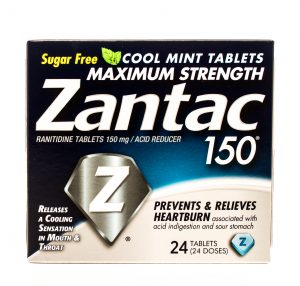Many of us suffer from heartburn, and one of the most popular ways to treat it is by taking Zantac. Until recently, Zantac was considered a very safe medication and was available without a prescription.
Given how well it worked, along with its affordable price and the perception of safety, hundreds of thousands of people, if not millions, took Zantac. In the fall of last year, the US Food and Drug Administration (FDA) reported that this popular drug might contain N-Nitrosodimethylamine (NDMA), a likely cancer-causing substance.
The past few months have resulted in mass voluntary recalls and a rush of FDA updates and reports about the possible dangers of taking Zantac and what it means for consumers. This blog post will attempt to summarize what’s going on and briefly discuss what happens next.
What Is Zantac?
Zantac is the brand name of a popular H2 histamine receptor antagonist called ranitidine. In plain English, Zantac is an antacid. It works by reducing the amount of stomach acid your body produces. Zantac is most commonly used to treat heartburn, ulcers and acid reflux.
What Is NDMA?
Before you ask, no, Zantac won’t get you high. Though the initials might seem similar, Zantac does not contain the active ingredient found in ecstasy. Ecstasy is 3,4-methylenedioxymethamphetamine or MDMA. The possible carcinogen in Zantac is NDMA, not MDMA. Confusion is understandable given how an “N” not only looks like an “M,” but it sounds that way, too.
The FDA considers NDMA a “probable carcinogen” as it has caused cancer in laboratory animals. NDMA, in very small doses, is possibly not harmful as it’s often found in cured and grilled meats. But with enough exposure, NDMA may cause cancer in humans, such as in the bladder and stomach. NDMA can also be harmful to your liver.
How Much NDMA Is in Zantac?
 One of the first publicized instances of NDMA causing cancer was the Citizen Petition sent by Valisure to the FDA on September 9, 2019. In this petition, Valisure explained that in its testing, it found alarming levels of NDMA in ranitidine.
One of the first publicized instances of NDMA causing cancer was the Citizen Petition sent by Valisure to the FDA on September 9, 2019. In this petition, Valisure explained that in its testing, it found alarming levels of NDMA in ranitidine.
Per the FDA, humans can acceptably consume up to 96 nanograms (ng) of NDMA per day. Valisure tested various types of over-the-counter 150 mg ranitidine medications found at stores like Walmart, Walgreens and CVS.
Valisure discovered that the amount of NDMA found in each 150mg dose ranged from 2.2 to 3.2 million ng. So by taking just one 150mg pill each day, a person was potentially consuming about 30,000 times the amount of NDMA the FDA says is acceptable.
Even when using modified testing methods that should better simulate the human body, Valisure found that each 150mg pill had between 23,600 and 304,500 ng of NDMA. This still vastly exceeds the FDA’s recommendation.
Things get complicated when you look at the FDA’s ranitidine testing results, which found far lower levels than Valisure did. The levels, while elevated, did not alarm the FDA enough to stop the sale of ranitidine.
What’s the FDA Doing About Zantac?
The FDA hasn’t done much besides issue Statements, Press Releases and Updates. However, they did complete their own testing of ranitidine and have asked ranitidine manufacturers to test for NDMA before their products hit store shelves. The following is a recent timeline of events:
September 13, 2019: the FDA publishes a Statement that announces it had become aware of possible problems with ranitidine. The FDA mentions that concerned consumers may ask for a different prescription or take an alternative over-the-counter antacid.
September 24, 2019: the FDA publishes a Press Release announcing the voluntary recall of prescription ranitidine capsules distributed by Sandoz, Inc.
September 26, 2019: the FDA alerts consumers and medical professionals that generic over-the-counter ranitidine made by Apotex Corp was being voluntarily recalled.
October 2, 2019: the FDA discusses more effective methods of ranitidine testing. Specifically, lower temperature testing methods should be used to avoid artificially raising NDMA levels.
October 23, 2019: the FDA further discusses NDMA testing procedures.
October 28, 2019: FDA announces more voluntary recalls.
November 1, 2019: the FDA publishes its ranitidine testing results for NDMA in an Update and issues a Statement. The overall conclusion is that NDMA levels were somewhat higher than what the FDA recommends, but not high enough to require all sales of the drug to stop. In fact, the FDA states that:
“FDA has determined that the levels of NDMA in ranitidine and nizatidine are similar to the levels you would expect to be exposed to if you ate common foods like grilled or smoked meats.”
November 8, 2019: the FDA alerts the public about a voluntary recall for ranitidine medications manufactured by Aurobindo Pharma USA.
November 22, 2019: the FDA mentions more voluntary recalls for ranitidine medications.
December 4, 2019: the FDA asks manufacturers to test for ranitidine before shipping to retailers.
December 18, 2019: the FDA announces a voluntary recall for ranitidine medications manufactured by Glenmark Pharmaceutical Inc.
January 8, 2020: the FDA announces that Appco Pharma LLC and Northwind Pharmaceuticals (for tablets manufactured by Glenmark Pharmaceutical Inc.) were issuing voluntary recalls of ranitidine.
For a complete list of FDA recall announcements involving ranitidine, please go to the FDA’s Recalls, Market Withdrawals, & Safety Alerts page.
Zantac Lawsuits Emerge
Given how popular Zantac has been and how long it’s been on the market in the US, we’re probably going to see a large wave of litigation against various ranitidine pharmaceutical companies. The lawsuits have already begun. A few of them include:
- Coggins v. Sanofi Case No. 3:19-cv-20060
- Rodriguez v. Sanofi, Case No. 1:19-cv-09527-AT
- Garza v. Sanofi, Case No. 5:19-cv-05772-NC
- Melillo v. Sanofi, Case No. 1:19-cv-06376
What’s important to note is that these lawsuits do not focus on cancer or other personal injuries due to the NDMA. These lawsuits were filed in late 2019 after news broke about the NDMA risks. Therefore, they are mostly suing on the basis of consumer fraud, breach of expressed and implied warranties and other unfair competition laws.
It’s only a matter of time before the personal injury class action lawsuits begin. One reason why they haven’t arrived yet is because they’re far more involved legal cases.
In most of the current cases in litigation now, plaintiffs are basically saying, “the defendant deceived me by not telling me of the health risks in taking ranitidine.” This is a lot easier to prove than saying, “ranitidine caused my cancer.”
Cancer is a complicated disease. Plaintiffs must figure out how much ranitidine was needed to cause cancer. This isn’t to say it’ll be impossible to prove ranitidine caused injuries in people, but it’ll take time to build a case.
What Does the Future Hold for Zantac?
These are still very new developments, so it’ll take some time to create a personal injury lawsuit against the makers and distributors of ranitidine. But there is huge potential for massive litigation. For instance, from 2007 to 2017, ranitidine was prescribed about 15 million times . . . per year . . . in just the US. And this doesn’t even count over-the-counter sales.
As more lawsuits get filed, it’s possible we can expect them to be placed into a multi-district litigation, or MDL. This will hopefully allow for more efficient litigation and maybe even a possible settlement that avoids decades of time in the courts.
Right now, it’s probably best to avoid taking anything containing ranitidine without at least talking to your doctor first. And as I get more information, I’ll post the updates in this blog. If you want to discuss Zantac, call me: 919.546.8788.
 North Carolina Product Liability Lawyer Blog
North Carolina Product Liability Lawyer Blog


